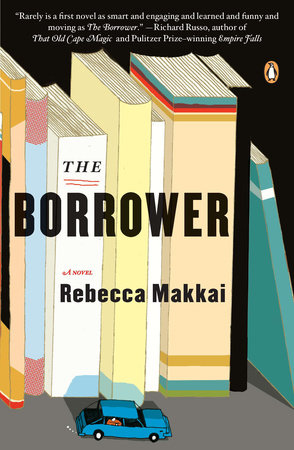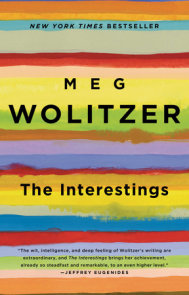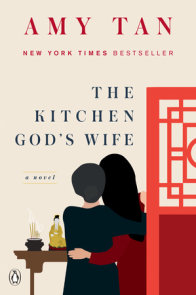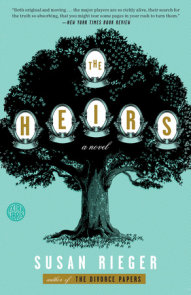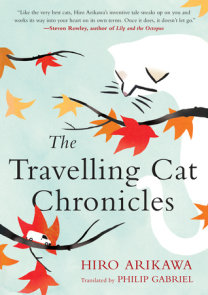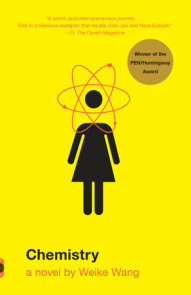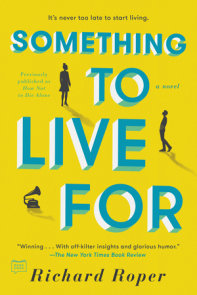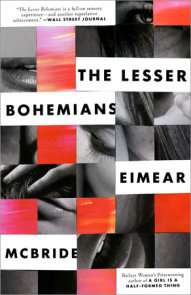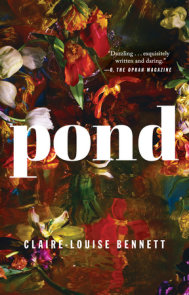READERS GUIDE
Questions and Topics for Discussion
INTRODUCTION
After graduating magna cum laude from college, Lucy Hull went to work as a children’s librarian in small-town Missouri. At twenty-six—much to the chagrin of her successful Russian émigré father—she is already settling into the life of “a simple maiden lady librarian” (p. 8). But when Lucy’s favorite young patron runs away from home, she makes an impulsive decision that will forever change the way both see themselves, the world, and the stories they love.
Ian Drake is ten years old, smart, and almost certainly gay. Reading is his greatest joy, and he devours everything that Lucy recommends. Although her boss warns that Ian’s mother wants him to “read books with innocuous titles and pleasant covers” (p. 6), Lucy guides him to Tales of a Fourth Grade Nothing, D’Aulaires’ Greek Myths, and From the Mixed-up Files of Mrs. Basil E. Frankweiler.
Soon, however, Ian’s mother, Janet, visits the library, insisting that Lucy censor her son’s future reading and only allow “books with the breath of God in them” (p. 11). Lucy is furious but unable to articulate her outrage.
Lucy begins helping Ian smuggle home forbidden reading material, but it isn’t until he gives her an origami Jesus that she understands the full extent of Ian’s unhappiness. When Lucy unfolds the paper, she finds a printout of an e-mail testimonial from Janet, praising Pastor Bob and his “Glad Heart Ministries, an organization ‘dedicated to the rehabilitation of sexually confused brothers and sisters in Christ'” (p. 49).
Is Ian consciously trying to enlist her sympathy? Lucy is horrified, but unsure of how to help. She’s also somewhat distracted by Glenn, a cheesy pianist who’s been wooing her “with the library copy of 1,000 Great Date Nights” (p. 66).
All changes when Lucy opens the library one morning to find Ian sitting amid a mountain of origami. He’s spent the night there and informs her that he’s got a knapsack filled with PowerBars and no intention of going home. On the drive back to the Drakes’, Lucy thinks about Pastor Bob and feels “a thickening fog around [her] head like alcohol or a dream” (p. 92). Suddenly the pair—scant on funds and utterly without a plan—heads off on the highway out of town.
Their meandering route includes an encounter with a saint’s relic, two stopovers with the Russian Mafia, and Glenn’s unwelcome reappearance. Finally, in Vermont, at the edge of America, Lucy is forced to confront her own motives in absconding with Ian and the sobering reality that they are no longer alone on their journey.
Rebecca Makkai’s debut novel, The Borrower, is a charming and poignant romp through memory, childhood, and literature that will utterly bewitch anyone who’s ever found salvation between the covers of a book.
ABOUT REBECCA MAKKAI
Rebecca Makkai’s first story, at the age of three, was printed on the side of a cardboard box and told from the viewpoint of her stuffed Smurf doll. More recently, her stories have been anthologized in The Best American Short Stories 2008, 2009, and 2010, and she has been chosen by Geraldine Brooks for The Best American Short Stories 2011. Her stories have also appeared in Tin House, Ploughshares, The Threepenny Review, and on Public Radio’s Selected Shorts. She lives in Chicago with her husband and two daughters.
A CONVERSATION WITH REBECCA MAKKAI
Q. What inspired you to write The Borrower? Did you ever have a friend like Darren?
Of all the characters in the book, Darren might be the most real, although he’s an amalgam of several different people I knew in high school and college. Some of their stories ended well, and some ended very badly. I wrote his sections a few years ago, but then in 2010, as I finished editing The Borrower, there was a spate of tragic reports about gay teenagers taking their own lives. It’s my strong belief that the media focus wasn’t the product of any new trend but rather our sudden national obsession with news stories featuring the words “bully” and “suicide.” You start paying attention to those stories, and, lo and behold, they’re largely about gay teenagers. I’m grateful, though, for that media blitz, however ephemeral, since some good came of it—notably the “It Gets Better” project, (www.itgetsbetter.org) which I dearly hope that Ian, in his fictional universe, has discovered.
That sad and familiar narrative wasn’t quite the spark behind The Borrower, though. I became aware, about ten years ago, of the numerous groups that (like the fictional Glad Heart Ministries) attempt to “turn” gay or gay-identified kids, teens, and adults straight. Of all possible viewpoints on that issue, I was intrigued most by that of an outsider: someone who cared very much about the child at stake but had no legitimate recourse. I think Lucy’s is a relatable narrative if only because that’s how so many of us feel, hearing reports of children we don’t even know who are growing up in hostile environments and finding ourselves utterly unable to help. What we don’t have, of course, that Lucy does, is opportunity. What each of us would do if given the chance… I suppose that’s a question for the book group after-party.
Q. Lucy and Ian’s journey parallels those in both Vladimir Nabokov’s Lolita and Mark Twain’s The Adventures of Huckleberry Finn. Was it difficult to find the right balance?
It was fun to play with those extremes: the delusional, monster kidnapper and his victim, versus the two misfit companions helping each other escape. Lucy isn’t sure where she falls on that spectrum, but, being the librarian she is, she sees her whole life through a sort of narrative lens and wants to define herself on those terms.
Nabokov’s influence actually helped me through a difficult pass in the writing of this story; I’d gotten Lucy and Ian on the road, but after they got past Chicago the story abruptly lost steam. I dug back into Lolita and saw what I’d forgotten, and what the old master had done so effortlessly: he had them followed. I embraced “Mr. Shades” as a nod to Lolita‘s Quilty plotline—but even if it hadn’t fit my larger thematic motives, I’d still have stolen the idea, because it was such a good, basic one. I’m pretty sure I literally hit myself on the head when I saw it. As soon as Lucy and Ian got a follower, too, I had a triangle—and that’s when plots (and life) get interesting.
Of course there’s a whole heaping dose of The Wizard of Oz in there, too, and there’s even some Ulysses, buried so deep that only the true-of-English-major-heart will find it.
Q. Who are some of your other literary influences?
I’ve learned about endings from Alice Munro, complexity from Tom Stoppard, regret from Ian McEwan, character from Richard Russo, strangeness and possibility from Italo Calvino, and rhythm (of both language and plot) from Salman Rushdie. And the children’s author Lois Lowry first taught me (many, many years ago) how to tell a story.
Q. Why do you think the librarian’s stereotypical forlorn spinster image still persists?
I have absolutely no idea, because most of the librarians I know are loud and rebellious individuals.
Q. Who do you envision as your novel’s ideal reader? Are you concerned that its language and matter-of-fact treatment of sex and drinking will keep it from some of the young adult readers who might most benefit from it? What age would this book be appropriate for among young adults?
I never set out to write something for younger readers, although I do think the book would be appropriate for intelligent high school students. There is a need, always, for books that guide adolescents through the difficulties of growing up different, but I’m not a Young Adult author, and I very much hope those kids could find solace someplace better than in a novel with an extended Nabokov reference on the very first page.
I do, though, envision an audience of those same souls Lucy refers to in the penultimate chapter—the ones who used to read under the covers with the flashlight, and the ones who don’t know where they’d be without the stories that got them through childhood.
I think many of us who’ve lived our lives as readers did walk into our public libraries one day, maybe around the age of ten, and get abducted in the most wonderful way by what we found there. In that sense, there’s as much of Ian in me as there is of Lucy, and I’d imagine I won’t be the only one who feels that way.
Q. At what age do you think a child should be educated about human sexuality?
I’m not the expert on that, but I’ve seen it borne out that the more honest parents are (at an age appropriate level), the more gracefully their children come to accept the complexities of the adult world. When my older daughter was two, she noticed a little girl eating with two women (who were probably the mother and grandmother, really) in a restaurant. Our conversation, verbatim, was this:
“Mommy, does some kids have two mommies?”
“Yes.”
“Does some kids have two daddies, instead of any mommies?”
“Yes.”
It wasn’t any stranger to her than anything else in her two-year-old universe, and she went on happily eating her pickle. Why some people have to turn that same question into a national crisis, I’m unsure.
Q. You’ve earned wide acclaim for your short stories, but The Borrower is your first novel. How did you feel about making the leap?
I’ve actually been working on The Borrower since before I published my first story, so I haven’t felt this as a change; it’s more that I’ve been telling a big story alongside my short ones the whole time, and now it’s finally getting its airtime.
I imagine I’ll keep writing both for as long as I can. I found it healthy, while writing a novel, to have other projects going. Not just for my sanity, but also as a sort of filter for ideas: some really irresistible detail would occur to me, and I’d have to stop and think whether it was right for The Borrower, or whether it really belonged in one of those stories. Without other outlets, I’d have been tempted to throw it all in there. I might still be writing it, and it would be a thousand pages long. Lucy and Ian would be somewhere in eastern Indiana by now.
Q. What are you working on now?
My second novel is very tentatively called The Happensack, and it’s the story of a haunted house and a haunted family, told in reverse. It’s been a very different writing experience for me this time around, with a lot of meticulous planning and plotting, and riveting historical research that’s led me to spend much more time in actual libraries than I did when I wrote The Borrower.
I’m getting ready to immerse myself in the world of 1955 this summer, in preparation for writing that section of the novel, and so I’m amassing music and magazines and books from that year. It’s sort of the Stanislavsky school of writing—a method I’m awfully glad I didn’t employ for The Borrower.
DISCUSSION QUESTIONS









